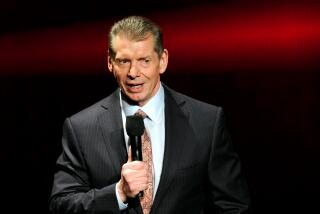Dole sells a 41% stake in public offering, raising about $450 million
- Share via
Investors snapped up shares of Dole Food Co. on Thursday when the world’s largest produce company returned to the public equity market after a six-year absence, but the stock price was less than it had expected.
Analysts said Wall Street’s enthusiasm for the deal was damped because of the large size of the offering and concerns over Dole’s ownership structure.
The Westlake Village food giant sold a 41% stake in the company at $12.50 a share. The deal raised about $450 million, which will be used to pay off corporate borrowings and debt accumulated by Dole’s 86-year-old billionaire owner, David H. Murdock.
The price was lower than the $13 to $15 a share Dole estimated when it pitched the offering to Wall Street.
“Investors are being more cautious in terms of what they are paying for these large deals. It wasn’t a surprise to see some pressure on the price,” said Eric Guja, an analyst with Renaissance Capital.
Murdock took the company private in 2003 and will remain chairman and controlling shareholder. He now owns 59% of its shares.
Founded in Hawaii in 1851, Dole is the nation’s No. 1 seller of fresh fruits and vegetables including bananas, pineapples and fresh-cut salads. It’s also a major producer of pineapple juice and canned pineapple. It has the top or No. 2 market-share position in many of its product categories.
But in recent years, Dole has struggled to cope with a high debt load and declining sales. For the third quarter ended Oct. 10, Dole said, it had an operating loss of $58.5 million, compared with an operating loss of $2.3 million in the same period a year earlier. Revenue fell 13% to $2 billion from $2.3 billion.
The offering will allow Dole to trim its borrowings to about $1.6 billion from $1.9 billion, a move that is a “credit positive,” said Carla Norfleet Taylor, an analyst with Fitch Ratings.
In addition, by having shares that now trade on the New York Stock Exchange under the DOLE symbol, the food company has better access to equity markets in case it needs future capital, Norfleet Taylor said.
Some analysts believed that investors demanded a discount in the share prices because they were concerned about Dole’s warnings in a Securities and Exchange Commission filing that Murdock would maintain a firm grip on the business.
“Any time a majority shareholder controls a company, it should make you cautious. His interests and your interests might not align,” Scott Mushkin, an analyst with Jefferies & Co. in New York, said last week, when Dole started to pitch the deal to Wall Street.
However, Mushkin said after the offering went through Thursday that the $12.50 share price “was solid considering some investor concern regarding the ownership structure.”
In its prospectus, Dole warned investors, “We are a controlled company, controlled by David H. Murdock, whose interests in our business may be different from yours.”
“Mr. Murdock and his affiliates will, for the foreseeable future, have significant influence over our management and affairs, and will be able to control virtually all matters requiring stockholder approval, including the election of directors and significant corporate transactions such as mergers or other sales of our company or assets,” the Dole filing said.
The company also signaled that there would be little chance Dole would become a takeover target any time soon, and that could hurt the value of its shares.
Dole said its corporate rules and bylaws “could make it more difficult for a third party to acquire control of us, even if the change in control would be beneficial to stockholders.”
The deal gives Dole an equity value of about $1.1 billion. That is about 42% below the $1.9-billion value of the company’s shares when Murdock took it private six years ago.
The company paid Murdock $2.7 million in salary and bonuses last year. He became chief executive in 1985 but in 2007 relinquished the job to David DeLorenzo.
Murdock is known as a quirky billionaire who, among a variety of business ventures, owns almost all of the Hawaiian island of Lanai. The death of his wife, Gabriele, in 1985 convinced him that their high-fat, high-calorie diet of prime rib and potatoes contributed to her illness. He adopted a fish and vegetarian diet and credits the change for his longevity.
Murdock, the son of a traveling salesman, didn’t complete high school. He grew up in a household where “if it wasn’t cooked in bacon grease, it didn’t taste good,” he told The Times in a 2006 interview. Murdock is known for banning hamburgers in the cafeteria of Dole’s corporate headquarters and for having opened a 20-acre resort and health institute in Westlake Village. Guests can take a “medical vacation” at his hotel and get a snapshot of their current state of health and advice from professionals on how to prevent illness.
A corporate restructuring wrapped up in the offering uses money from the stock sale to pay off $115 million of Murdock’s debts accumulated from building and operating the wellness complex, according to SEC documents.
The transaction also includes a merger between Dole and Murdock’s personal investment arm and a secondary transaction that pays off an additional $90 million of Murdock’s debt guaranteed by the food company.
--
twitter.com/latimesjerry
More to Read
Inside the business of entertainment
The Wide Shot brings you news, analysis and insights on everything from streaming wars to production — and what it all means for the future.
You may occasionally receive promotional content from the Los Angeles Times.











